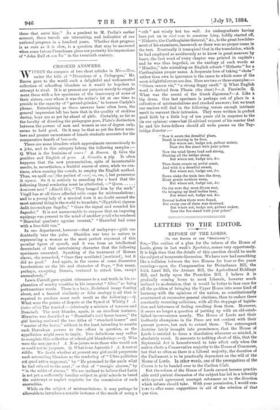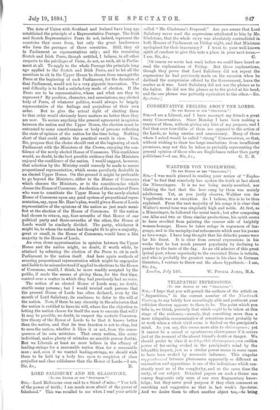LETTERS TO THE EDITOR.
REFORM OF THE LORDS.
[TO THE EDITOR OF THE "SPECTATOR."
SI11,—The outline of a plan for the reform of the House of Lords, given in last week's Spectator, comes very opportunely. It is high time that the details of this question should be made the subject of temperate discnssion. We have now had something like a collision between the two Houses for four or five years running—upon the Compensation for Disturbance Bill, the Irish Land Bill, the Arrears Bill, the Agricultural Holdings Bill, and lastly upon the Franchise Bill. I believe it is gradually coming home to most Liberals, however much inclined to moderation, that it would be better to face once for all the problem of bringing the Upper House into some kind of harmony with the opinions of the nation, as constitutionally ascertained at successive general elections, than to endure these constantly recurring collisions, with all the stoppage of legisla- tion and bitterness of feeling resulting from them. Moreover, it seems no longer a question of putting np with an old-estab- lished inconvenience merely. The House of Lords and their foolhardy champions in the Press are not content with their present powers, but seek to extend them. The extravagant doctrine lately brought into prominence, that the House of Lords is entitled to force a dissolution whenever so minded, is absolutely novel. It amounts to nothing short of this, that the Septennial Act is henceforward to take effect only when the nation elects a Conservative majority to the House of Commons, but that as often as there is a Liberal majority, the duration of the Parliament is to be practically dependent on the will of the House of Lords. In other words, one of the prerogatives of the Crown is to be banded over to the Carlton Club.
But the reform of the House of Lords cannot become practic- able until patient discussion of the subject has led to a tolerably wide-spread agreement amongst reformers as to the direction which reform should take. With your permission, I would ven- ture to offer some suggestions in aid of the solution of that que The Acts of Union with Scotland and Ireland have long ago -established the principle of a Representative Peerage. The Irish and Scotch Representative Peers do not, indeed, represent the • countries they come from, but only the great landowners who form the peerages of those countries. Still, they sit in Parliament as representatives only ; and the remaining Scotch and Irish Peers, though entitled, I believe, in all other respects to the privileges of Peers, do not, as such, sit in Parlia- ment at all. To apply to the whole Peerage the principle long -ago applied to the Scotch and Irish Peers, and to let all the members to sit in the Upper House be chosen from amongst the Peers at the beginning of each Parliament, for the duration of that Parliament, would not be a very gigantic innovation. The real difficulty is to find a satisfactory mode of election. If the Peers are to be representative, whom and what are they to represent P By position, character, and associations, any elected body of Peers, of whatever politics, would always be largely representative of the feelings and prejudices of their own order. But to give the actual right of electing them to that order would obviously leave matters no better than they are now. To secure anything like general agreement in opinion between the nation and the Upper House, the election must be -entrusted to some constituencies or body of persons reflecting the state of opinion of the nation for the time being. Nothing short of that could attain the practical result in view. You, Sir, propose that the choice should rest at the beginning of each Parliament with the Ministers of the Crown, enjoying the con- fidence of the newly-elected House of Commons. This confidence would, no doubt, be the best possible evidence that the Ministers -enjoyed the confidence of the nation. I would suggest, however, that selection by the Ministry could scarcely be made to secure proportional representation, which seems peculiarly desirable in an elected. Upper House. On this ground it might be preferable to go beyond the Ministers, either to the House of Commons which chooses the Ministers, or to the constituencies which -choose the House of Commons. An election of the number of Peers who were to constitute the Upper House by the newly-elected House of Commons upon any good system of proportional repre- sentation, say, upon Mr. Hare's plan, would give a House of Lords representative of the opinions of the nation as just made mani- fest at the election of the House of Commons. If the nation had chosen to return, say, four-sevenths of that House of one political party and three-sevenths of the other, the House of Lords would be similarly divided. The party, whichever it might be, to whom the nation had thought fit to give a majority, great or small, in the House of Commons, would have a like majority in the House of Lords.
An even closer approximation in opinion between the Upper House and the nation might, no doubt, if worth while, be attained by referring the election of the Peers to sit in each Parliament to the nation itself. And here again methods of securing proportional representation which might be unpopular and liable to be misunderstood if -applied to elections to the House of Commons, would, I think, be more readily accepted by the public, if made the means of giving them, for the first time, -control over a matter in which they had previously had no voice.
The notion of an elected House of Lords may, no doubt, startle many persons ; but I would remind such persons that the present House of Lords has often declared, even by the mouth of Lord Salisbury, its readiness to defer to the will of the nation. Now, if there be any sincerity in the admission that the nation is entitled to have its will, where lies the objection to letting the nation choose for itself the men to execute that will ? It may be possible, no doubt, to suspect the esoteric Conserva- tive theory of the House of Lords to be that it knows better than the nation, and that its true function is not to obey, but to save the nation, whether it likes it or not, from the conse- quences of its own mistakes. That every nation, like every individual, makes plenty of mistakes no sensible person doubts. But we Liberals at least no more believe in the efficacy of leading-strings for a reasonable nation than for a reasonable man ; and, even if we wanted leading-strings, we should wish them to be held by a body less open to suspicion of class prejudice and class selfishness than the House of Lords.—I am,



































 Previous page
Previous page